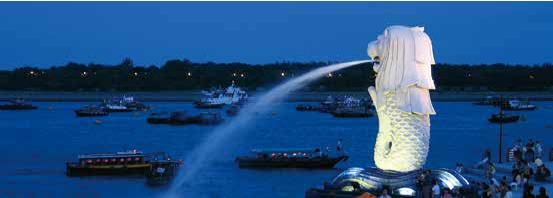Issue:
Forget the political sex story; go with crocodile gnawing or fly to Bangkok. By Jan Lund

THE GLOBAL HEADLINES REPORTING THE LATEST rankings read, “Singapore: the most expensive city in the world!” But we knew that already down here in the Little Red Dot, where people dream of going to Tokyo for a cheap, prolonged weekend.
Of course, true to their role as defenders and promoters of Singapore Inc., the local media immediately ran stories that claimed the ranking only concerned expats. For the locals, they said, the story was different. Locals were still living an affordable life, thanks to all kinds of government support programs. Which, of course, is true.
There are already enough problems with the general perception that 2.1 million foreign passport holders out of a population of 5.4 million might be a tad too many. It’s important for the media to report frequently and matter-of-factly that those numerous strangers are not running away with all the benefits.
Still, Singapore is an incredible success story one that, in general, the Western media doesn’t like to report. They’d prefer the chewing gum story that’s stuck to the bottoms of the newsroom desks (nowadays you can chew as much as you like, though it’s not for sale anywhere in the republic). Or the eternal story about the delinquent American youngster getting caned. (Yes, they are still using the old British praxis of caning convicted criminals. Yours truly is fortunately out of that loop since they only beat males under 50 years of age.)
For Singaporeans, the news stories are trade, finance and the economy. This is not a place where big ideological and philosophical discussions take place; not in the media and after eight years here, I can say not in private. Singapore lives on a burning platform of fear fear of being left behind on the stormy globalized seas. It’s all about survival: “If we don’t outperform everybody else with our skills and determination, we are doomed.”
For the guys ruling the hardcore newsrooms of the Western world, those stories are of no or little interest. Which is why the Foreign Correspondents Association (FCA) here is a motley crew without its own premises, very fragmented and with more than half of the members belonging to newswires.
The FCA fights for relevance and survival, a difficult task since most reporters outside the financial conglomerates like Bloomberg are not here for Singapore. They’re here because Singapore is the center of Asia, ideally located for operations all over Asia.
For a one-man band this is the place to be no matter if it’s a company running just one facility east of Suez or a freelancer like me targeting all of Asia. We have easy instant access to the whole region from Changi Airport, where an airplane takes off or lands every 90 seconds 24/7.
Another major reason to settle here is the number of accessible think-tanks; it’s like nowhere else in Asia. Books, papers, speeches and presentations from international groups float around this English-speaking universe. Once again, there’s not so much about Singapore but there’s plenty about trends and developments all over Asia.
MOST REPORTERS ARE NOT HERE FOR SINGAPORE. THEY’RE HERE BECAUSE SINGAPORE IS IDEALLY LOCATED FOR OPERATIONS ALL OVER ASIA
If you need generalist input from the region, the Straits Times is the newspaper to read: broad, deep and very informative, despite the fact that it is, as an editor once explained to me, a supporter of the ruling PAP party and plays a part in the nation building. Don’t expect censorship, but understand that the stories on Singapore are carefully weighted and valued from this perspective.
The local media landscape is framed by two partly government-owned monopolies: Singapore Press Holdings, which is in charge of all the print (except the free paper Today), and Media Corp., which runs all the electronics.
They don’t exist to throw bloody knives at the government but are surprisingly unbiased in their coverage of elections, society and, especially, the scandals that roll through political life in Singapore. In fact, no detail in a sex scandal or court case is too small to report and we’re always supplied with full names and photos.
To report news from here on a daily basis is almost impossible. Though my eight years here have seen Singapore transform itself beyond recognition, I’ll only grab space overseas when something like the Marina Bay Sands casino opens with all its tinsel and wonders.
When I was a stringer for DPA, I once tried to pitch a story about how the speaker of parliament, who was considered a potential prime minister, was caught with his pants down a fashion statement he was sharing with a young female party worker. He was sacked from party and parliament, but there was no interest at all. I found more acceptance for a feature about Singaporeans turning to crocodile eating and a campaign for upgrading public toilets.
So yes, Singapore is a terrific place to cover everything else but Singapore. From a rational point of view, it may be the place to run all-Asian coverage. Setting up my media company in Singapore instead of Tokyo was not easy, but it was a commercial management decision. Singapore is my brain though my heart still belongs to Tokyo.
Jan Lund, a former correspondent for the Danish newspaper Jyllands-Posten, has settled in Singapore, where he writes columns, books and publishes magazines.

